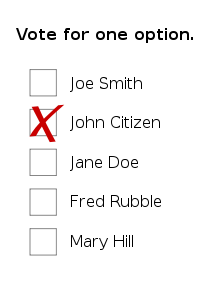Winner takes all
Winner take(s) all may refer to:
Competition, economics and politics
Film
Television

Plurality voting system
A plurality voting system is a voting system in which each voter is allowed to vote for only one candidate (the correct name is Single-member district ) , and the candidate who polls more votes (plurality) than any other candidate is elected. In a system based on single-member districts, it may be called first-past-the-post, single-choice voting, simple plurality or relative/simple majority. In a system based on multi-member districts, it may be referred to as winner-takes-all or bloc voting. The system is used in some countries to elect members of a legislative assembly or executive officers, for example to elect the House of Commons in Canada and in the United Kingdom, the lower house (Lok Sabha) in India, and most elections in the United States.
The opposite to Single Winner system is the Proportional Representation, used by most electoral democracies worldwide, where the electors choose in first place the party which program they support, and the parties receive proportional number of sits to the numbers of votes. In such system the party which received most of votes, but less than 51% has to look for coalition with a party of similar program to create a government. The Proportional Election does not eliminate small parties at constituency, what increase a diversity/plurality and competition in parliament. Such diversity and competition is increasing of self-control of a parliament and prevents corruption and monopolization in politics.
Winner Takes All (game show)
Winner Takes All was a game show that aired on ITV from 20 April 1975 to 28 June 1988, first hosted by Jimmy Tarbuck from 1975 to 1986 and then hosted by Geoffrey Wheeler from 1987 to 1988. The show then returned on the screens in 1997, this time on Challenge TV hosted by Bobby Davro.
Gameplay
The two contestants started with 50 points each (30 points when it became a daytime show in 1988) and were asked multiple choice questions with six possible answers but each answer had some odds (Evens, 2–1, 3–1, 4–1, 5–1 & 10–1) and after each question was asked, the contestants were asked how many points they would like to bet and then, they selected the odds that corresponded to the answer they thought was correct, if they got the correct answer, they won the points the odds were worth, if they gave a wrong answer, they lost the points, the contestant with the most points won through to the final while the loser left the show with nothing. In later series, the losers took home a filofax (except the 1988 series where they took home an encyclopedia). In the Challenge TV version, the losers took home a Winner Takes All T-Shirt. Then, they played again with two different contestants and the winner of that met the winner of the first game.

Winner Takes All (2000 film)
Winner Takes All is a 2000 Hong Kong comedy film directed by Clifton Ko and featuring an ensemble cast. This film released was to celebrate Chinese New Year.
Plot Outline
Ferrari (Nicholas Tse), is a young swindler. He has been swindling people for money in many situations. One day, a cop nicknamed 'Stupid' (Karl Maka) is about to catch him swindling. He makes a deal with Ferrari to help him catch Master Swindler Wong (Sam Hui), the world's most notorious swindler who is penning his autobiography of his swindling ways. Ferrari runs into Bastardly Sze (Alec Su) who is stalking a rich woman and taking her pictures.
Paulina Wu (Joey Yung)'s father is one of the victims of the Master Castrator Swindler. So she decides to get her father's money back. On her trip, she runs into Bastardly Sze and Ferrari. The three wants swindle the girl, whom they think is Master Swindler Wong's daughter, Wu Sen Kwan (Ruby Lin).
With Wu Sen-kwan is her so-call assistant, Ching (Annie Wu). Ching and Ferrari once met before. Ferrari and Ching were going out on a date. Ching asked Ferrari wait for her to come, she never did. Later, he learned Ching had swindled him.
Podcasts:

